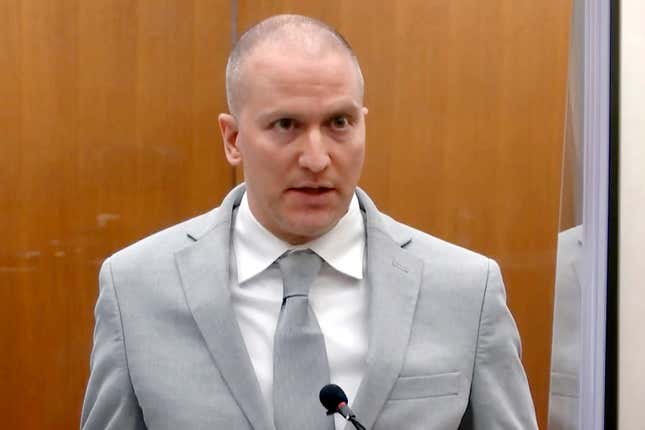
The ex-cop convicted of murdering George Floyd—a killing that reignited nationwide anti-police violence protests—has apparently had enough of losing in court. According to multiple media reports, Derek Chauvin is expected to change his not guilty plea on federal charges that he violated Floyd’s civil rights during the 2020 altercation that ended in Floyd’s death.
Chauvin is expected to appear in a change-of-plea hearing in a federal court on Tuesday in Minnesota. Chauvin had already pleaded not-guilty to the civil rights case against back in September. A change-of-plea proceeding could signal that he wants to avoid another lengthy and expensive trial, especially given his April conviction and 22.5-year sentence for Floyd’s murder. Chauvin is appealing that conviction but now says he’s broke and asked the state to appoint a public defender to handle that case in September.
It’s also possible Chauvin might be trying to help the three other ex-cops who caught state and federal cases of their own for their roles in Floyd’s death; all three stood and watched while Chauvin killed Floyd instead of intervening.
From the Associated Press
Chauvin and three other former officers — Thomas Lane, J. Kueng and Tou Thao — were indicted earlier this year on federal charges alleging they willfully violated Floyd’s rights. They were set to go to trial in late January.
Chauvin’s plea could be a positive for the other three. They had asked the court to separate their trials from Chauvin’s, arguing that his presence would hurt them before a jury, but that request was denied. Mike Brandt, a local defense attorney not connected to the case, said a trial without Chauvin could reduce some of the inflammatory evidence jurors would see.
Brandt has also said that if Chauvin pleads guilty, he can be compelled to testify — which could benefit the others if he says he was the veteran officer who made the decision to do what he did.
The information sent out Monday gives no indication that the other officers intend to plead guilty. Messages left for their attorneys were not immediately returned.
Mark Osler, a professor at the University of St. Thomas School of Law, said any potential prison time that Chauvin would face in the federal case would likely be served at the same time as his state sentence — but the federal term has the potential to be much longer, up to life in prison.
By claiming responsibility, Chauvin can reduce his federal sentence. Though rare, Osler said he could also arrange to serve his sentence in the federal system, which could benefit him since he has been in solitary confinement in Minnesota. Brandt added that Chauvin would still have notoriety in the federal system and might still need to be segregated.
“I’m guessing he actually negotiated something that would allow him to see the light of day before he leaves the earth,” Brandt said.
Let’s not forget that Chauvin did not negotiate with George Floyd while he begged for his life under Chauvin’s knee for nine minutes.

